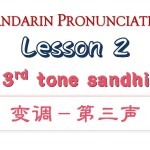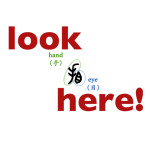Chinese is an easier language to learn
Finally got down to revamping this blog. Well, as with many other things in life, you can find lots of reasons for things you do or not do, but if they end up sounding like mere excuses it’s better not to mention them!
Anyway, to kick-start, here’s an article I saw on The Straits Times today: Chinese is an Easier Language to Learn.
I won’t say I agree a hundred percent with the writer, but her article, or at least the title, definitely reflects a great deal how I feel. When I read it today, I thought, great, somebody’s finally voiced my opinion on my behalf.
In fact, it’s a sentiment that I’ve been sharing with some of my friends and students, especially since coming back from my short study stint in India end of last year – I was there to learn Tibetan.
It’s the 4th language that I’m learning (if I could add Korean, which I only learnt for a few lessons, to the list, then Tibetan is the 5th.) I’m not claiming to be a linguist, but learning this new language has certainly confirmed my suspicion that Chinese is not the terror language that so many people make it out to be.
Well, to be fair, I have to first admit that Chinese characters are difficult, especially if you learn them as an adult. Pronunciation can be tough too, especially if your native tongue is comparatively simple phonologically. Also, writing fluently and understanding classical Chinese can be a real challenge. (That said, this is probably true for almost any language.)
But what I keenly felt during my study trip, what I actually want to emphasise here is, basic spoken Chinese is tremendously EASY.
Don’t believe me? Have you noticed that many of the Singaporeans who claim to dislike Chinese actually speak Mandarin or some other Chinese dialects when they are with their close friends? If they so prefer English, why the natural switch to Chinese when it comes to speaking? Of course this largely is also a cultural thing – language is a huge part of our whole being, it cannot be removed totally overnight, in a single generation.
But one other reason is – Chinese is a simple language. And according to the writer above, it’s logical. I can’t agree more.
Let’s look at these sentences:
1. I will go to the supermarket tomorrow.
2. I am going to the supermarket today.
3. I went to the supermarket yesterday.
4. 我 明天 (会) 去 超市。wǒ míngtiān (huì) qù chāoshì
5. 我 今天 (会) 去 超市。wǒ jīntiān (huì) qù chāoshì
6. 我 昨天 去 超市 (了)。wǒ zuótiān qù chāoshì (le)
For a start, let’s do a word count. To make the above sentences in Chinese, there are eight words (note: ‘word’ does not equal ‘character’) to learn. However, to make the same sentences in English, there are twelve words to remember. The brackets in the Chinese sentences above indicate that the words can be omitted. If we discount these words, then there’s even less to remember – only six. (In reality Chinese characters are not separated by spaces, but I’m separating them here for ease of counting.)
In English, the same action of ‘going’ takes on different forms according to the time you go to the supermarket. And then again, because the action takes place at different times, you have to take care of the auxiliary verbs too. To make things even more complicated, the noun ‘supermarket’ needs a determiner!
Well, I’ll admit that in order to drive my point across I’ve not given examples that are absolutely fair. For example, perhaps we could simplify the English sentences by changing ‘will go’ to ‘am going’ for sentence 1 – “I’m going to the supermarket tomorrow” sounds fine too, doesn’t it? Also, to express differences in nuance there can be varieties in the Chinese sentences too. But still the fact remains that there are more vocabulary and grammar rules to learn when it comes to English. Just imagine, for almost every single action, you exhaust more memory space for the multiple verb forms. You first need to know the present form, then the continuous, past and present perfect. But for Chinese, the same verb remains constant, which means that you have more ‘free space’ to learn other words at a faster pace.
The above are just some simple examples. I’ll end up writing a thesis if I were to think of more!
It’s the same situation when it comes to the other languages that I’ve learnt. Japanese, Tibetan and Korean also have tenses, and to make it tougher, there are various verb endings, as well as honorific and humble forms. Which made it so difficult for me to start making basic proper sentences in Tibetan, for there are so many rules to remember just to drive across a simple message which can be easily expressed in Chinese.
To wrap it up, actually I think every language is difficult in its own way. But for beginners learning to form basic sentences in Chinese, it’s really a breeze. Chinese might not be an easy language to master, but it’s not that difficult to pick up.
Note: Strictly speaking, for sentence 6, if it is just a simple statement, “了” has to be present to make it grammatical. (Huh? Chinese has grammar rules too? Oops, yes!) But the thing is, generally you will have no problem in making yourself understood even if you forget to put it in.
If you’ve enjoyed this, don’t forget to hit one of the sharing buttons below, and do join me on Google+/ Facebook/ Youtube/ Twitter/ Pinterest !










